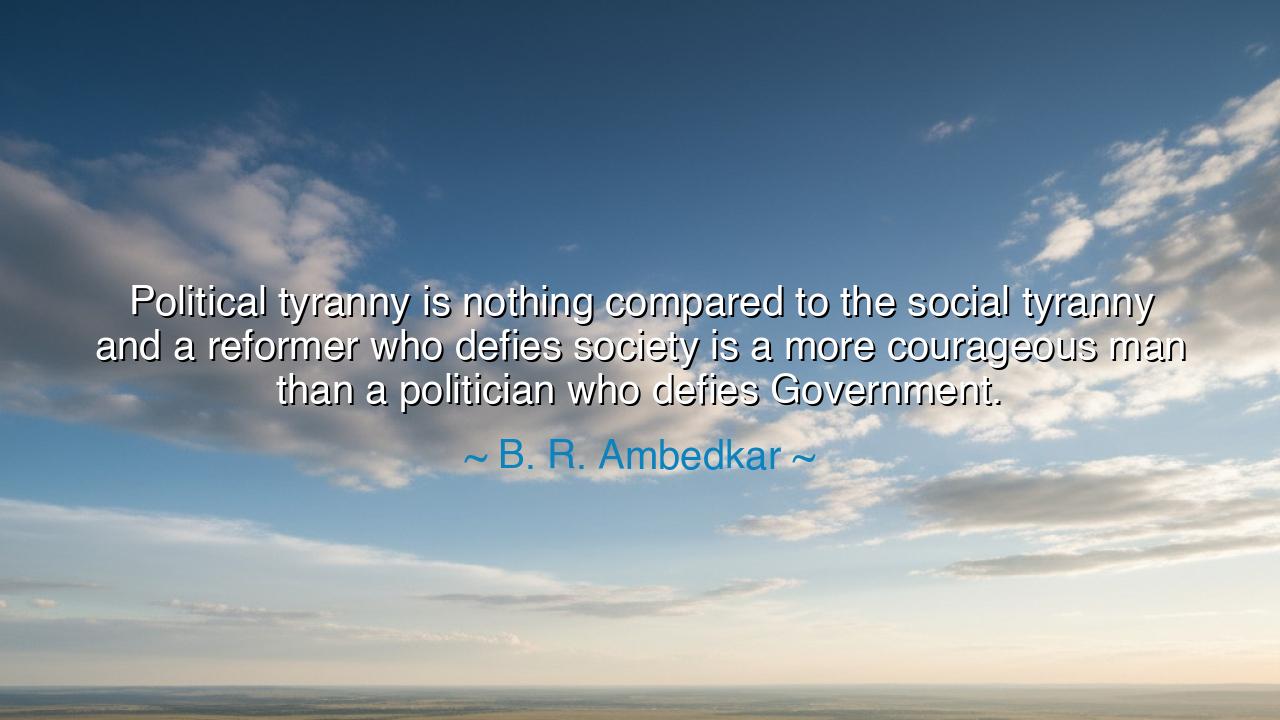
Political tyranny is nothing compared to the social tyranny and a
Political tyranny is nothing compared to the social tyranny and a reformer who defies society is a more courageous man than a politician who defies Government.






When B. R. Ambedkar spoke the words, “Political tyranny is nothing compared to the social tyranny, and a reformer who defies society is a more courageous man than a politician who defies Government,” he was not merely describing oppression — he was unveiling the hidden architecture of bondage. His insight pierces deeper than the surface of laws and governments, for he understood that the most enduring chains are not forged by rulers, but by customs. A tyrant’s rule may be overthrown by revolution, but the tyranny of social prejudice — of caste, of class, of tradition — lives within the very soul of a people, resisting every sword and law that would strike it down. Ambedkar, born an untouchable in India’s caste-ridden society, did not speak as an observer of injustice, but as one who had tasted its full bitterness.
The origin of this quote lies in his lifelong struggle against the caste system, that ancient tyranny which reduced millions to invisibility. He saw that while political freedom was essential, it was incomplete without social emancipation. What good is the vote, he asked, if a man cannot drink from the same well or walk the same road as another? A government’s oppression is external — it can be resisted through protest or war — but social oppression seeps inward, until the oppressed themselves begin to believe they are unworthy. Thus, to rebel against society’s prejudices requires a rarer kind of courage — the courage to stand alone against the judgment of neighbors, family, and even one’s own culture.
Ambedkar himself embodied that courage. Denied dignity by birth, he fought his way through humiliation to become one of India’s most learned men, earning doctorates from Columbia University and the London School of Economics. But he did not stop at personal triumph. He returned to challenge the very social order that had cast him out. He burned the Manusmriti, the ancient text that sanctified caste hierarchy, in a symbolic act of defiance. He led the Dalit movement, demanding equal rights, education, and representation for those considered “untouchable.” His courage was not of the battlefield but of the spirit — for he fought not an emperor or an army, but a civilization’s conscience.
To understand the depth of Ambedkar’s wisdom, one must contrast the two tyrannies he names: political tyranny and social tyranny. The first governs through fear — through prisons, laws, and threats. The second governs through shame — through ostracism, gossip, and silence. One punishes the body; the other poisons the soul. The politician who defies government risks exile or imprisonment, but the reformer who defies society risks being disowned by his own people, hated by those he seeks to free, and remembered as a heretic until time itself redeems him. Thus, Ambedkar’s statement is both a lament and a salute — a lament for how cruelly society guards its prejudices, and a salute to those who dare to face that cruelty alone.
History offers many such reformers who carried this sacred burden. Consider Galileo Galilei, who defied not a king but the social and religious order of his time. When he declared that the Earth moved around the Sun, he was not merely challenging astronomy; he was defying the very worldview of society. For his truth, he faced the Inquisition and was silenced. Or consider Rosa Parks, who refused to surrender her seat on a bus in Montgomery, Alabama. Her act of defiance was not against a government decree alone but against the unspoken laws of a racist society — laws written not in statutes but in human hearts. Like Ambedkar, she revealed that true revolution begins not in parliaments, but in the conscience of the oppressed.
Ambedkar’s warning endures: nations may achieve political independence, yet remain enslaved by social divisions. India gained freedom from British rule in 1947, but Ambedkar knew that independence without equality was hollow. He thus became the principal architect of India’s Constitution, embedding within it the ideals of justice, liberty, and fraternity. But he also warned that unless caste and discrimination were abolished in the hearts of men, the Constitution would remain a document without life. He foresaw that no democracy can thrive when its people are bound by invisible hierarchies.
The lesson of his quote is eternal: to reform society is to confront the collective mind of humanity — and that battle demands both moral strength and spiritual endurance. Every person who dares to speak truth to their own culture, who challenges injustice not from outside but from within, walks the path of the reformer. It is the harder road, for it is lonely and slow, but it is also the holiest. For when one heart awakens to truth, others follow — and from such awakenings, nations are reborn.
And so, remember this: tyranny begins where conscience sleeps. If you would honor the legacy of Ambedkar, do not be content with political liberty alone. Seek the freedom of the spirit, where no man is deemed lesser by birth, belief, or circumstance. When society commands you to conform, dare to stand apart. When injustice hides behind tradition, dare to expose it. For the truest courage is not in defying rulers, but in defying the chains that dwell within your own people — and sometimes, within your own heart.






AAdministratorAdministrator
Welcome, honored guests. Please leave a comment, we will respond soon